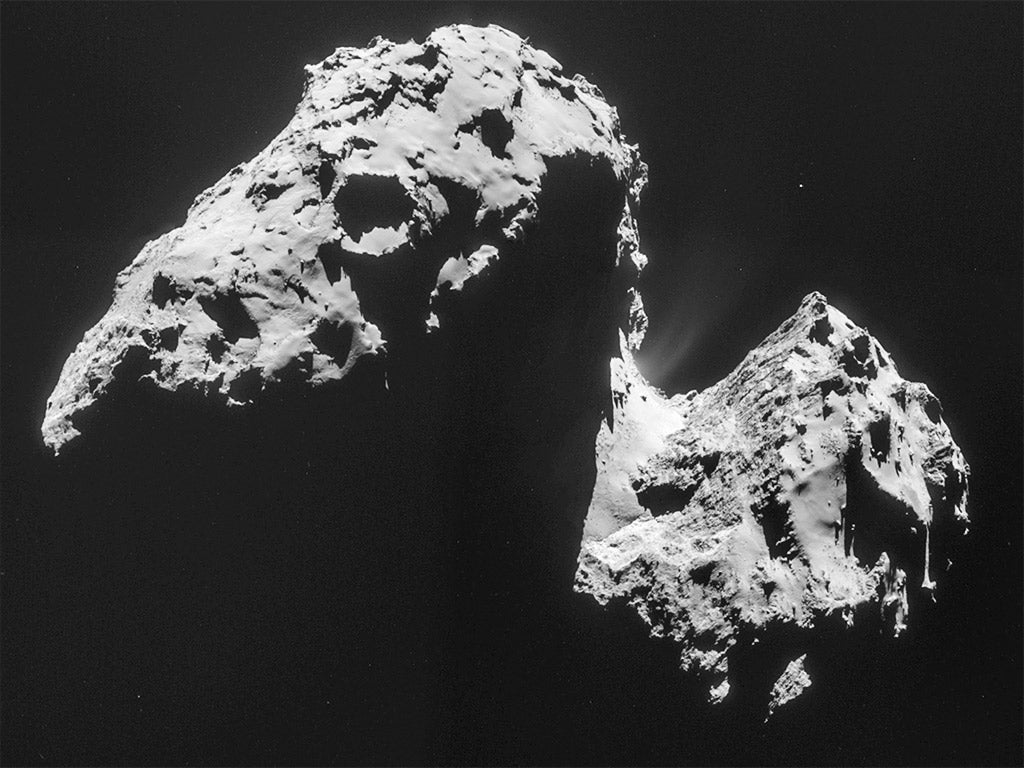Rosetta mission results shows water on Earth likely came from asteroid collisions
First detailed data from Rosetta is in

Your support helps us to tell the story
From reproductive rights to climate change to Big Tech, The Independent is on the ground when the story is developing. Whether it's investigating the financials of Elon Musk's pro-Trump PAC or producing our latest documentary, 'The A Word', which shines a light on the American women fighting for reproductive rights, we know how important it is to parse out the facts from the messaging.
At such a critical moment in US history, we need reporters on the ground. Your donation allows us to keep sending journalists to speak to both sides of the story.
The Independent is trusted by Americans across the entire political spectrum. And unlike many other quality news outlets, we choose not to lock Americans out of our reporting and analysis with paywalls. We believe quality journalism should be available to everyone, paid for by those who can afford it.
Your support makes all the difference.The first detailed scientific results from the Rosetta space mission, which successfully orbited a comet and then soft-landed a small robotic probe on its surface, have punctured one of the most plausible theories of how the Earth became a blue planet with vast oceans of water.
Scientists had until now believed the most likely explanation for the presence of water was one or more comets dumping it on the Earth when they collided on the planet a few hundred million years after it was created.
However, results from an instrument on board Rosetta, which will continue to orbit the comet 67P/Churyumov-Gerasimenko for another year, show comets are not likely to be the source of the terrestrial water on which life on Earth depends. Instead, it’s more likely to have come through asteroid collisions several hundred million years later.
The water on Earth has a particular signature in terms of its ratio of molecular isotopes – normal water and “heavy” water – and the water found on 67P has a ratio three times greater. This almost certainly rules out comets as the source of the water on Earth, said Kathrin Altwegg of the University of Bern, the principal investigator of the Rosetta instrument that measured the comet’s water isotopes.
In a study to be published in the journal Science, Professor Altwegg and her colleagues said that the threefold higher ratio of heavy water to normal water suggests that the family of comets to which 67P belongs “precludes the idea that this reservoir is solely composed of Earth ocean-like water”.
She said: “Models show that the Earth was quite hot after its formation so there was probably no water left on the surface of the Earth.”
Temperatures on the Earth were almost certainly too hot for water to have existed for several hundred million years. This suggests the water was brought here after the planet had cooled down to temperatures that would prevent it being boiled away into space, Professor Altwegg said.
Three years ago, scientists analysing the ratio of water isotopes on the comet Hartley 2 found that it perfectly matched the water-isotope ratio found on Earth, which supported the idea that comets had brought the water to Earth, she said.
However, the results from Rosetta now show that in fact comets generally have very different water isotopes and so are unlikely to have brought today’s water to Earth.
A more likely source now appears to be the rocky asteroids that bombarded the Earth about 3.8 billion years ago, about a billion or so years after the planet was created. These space objects are dry now because they have been orbiting the Sun for so long, but at that time they were wet, Professor Altwegg said.
“There was a lot of impact in the early times, and it’s very likely that some of the terrestrial water was brought at that time and so the only water that’s remaining is actually [from] asteroids or asteroid-like bodies from the inner Solar System,” she said.
Join our commenting forum
Join thought-provoking conversations, follow other Independent readers and see their replies
Comments